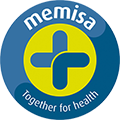Today, more people in Africa have a cell phone than access to clean water, World Bank figures (2019) show. Between 2010 and 2018, the number of internet users in Africa tripled. Internet access is growing faster, than access to electricity and clean water in the Global South (ITU data, 2019).
What does this say about the world we live in: that the digital divide is narrowing, creating new opportunities in poorer countries? Or just that our priorities are all wrong? The answer will depend on whom you ask….
In a country where patients often have to walk for hours to reach a health facility, a remote medical consultation can literally save lives.
Smart glasses for telemedicine in rural Congo
For a decade now, digitization has been everywhere. It affects all areas of society. It is therefore logical that development cooperation projects increasingly leverage digital technologies.
Whether it is an electronic payment system for farmers in Kenya, an SMS service in Niger to stay informed about weather conditions or an app to check the availability of ambulances in India: development cooperation did not stay on the sidelines watching other sectors accelerate digital transformation and become more efficient thanks to the deployment of innovative technologies.
But does this digitalization within international development cooperation create more efficiency? And does it lead to sustainable solutions?

In 2020, the medical NGO Memisa won the biennial Digitalization for Development (“Prize D4D“) award with its Smart Glasses 4 Health project. This project (in collaboration with Iristick, the Institute of Tropical Medicine and Avanti) aims to increase the quality of healthcare in the Democratic Republic of the Congo by using smart glasses technology.
The smart glasses contain a camera, microphone and audio speakers and are used in remote health centers. Thanks to the glasses, live information can be exchanged with doctors or experts who are not on site. The advantage of using such glasses (compared to telephones or tablets) is that healthcare providers have their hands free during the consultation. In a country like DR Congo where patients often have to walk for hours to reach a health facility, a remote medical consultation can literally save lives.
A genius project, no? Or just too good to be true?
In December 2020, I was in Kingandu in DR Congo and visited the health centers and the hospital where nurses and doctors use these smart glasses. I spoke there with patients, villagers, nurses, … to better understand the impact of the project.
We must be aware of the dangers and risks of digitization within development cooperation. The impact is often limited to a small group, sustainability is not guaranteed and the risk of failure is real.
Lessons from the field to keep in mind
In preparation, I read a report by CONCORD Europe (European confederation of relief and development NGOs) in which they list some of the factors that can determine the success or failure of digitization projects in an international context. Lessons I kept in mind once in DR Congo.
1. Ideally, digitization projects in the Global South build on the already available infrastructure.
This turned out to be no unnecessary luxury. Obstacle number one in Kingandu: due to technical problems, there was no stable Internet connection during the first few months, which meant that the glasses could not always be used.
But paradoxically, this also proves how innovative actions can turn shortcomings into opportunities. The absence of certain infrastructures in partner countries causes them to immediately adopt new technologies. The health centers included in the Memisa project, for example, run on solar energy via solar panels since there is no electricity network. Another example is mobile banking. In the absence of a wired network and few fixed computers, this quickly found acceptance in Africa.
2. Involve the whole community and make the project fit with already existing habits of the population.
Back to our smart glasses in DR Congo. I learned that local residents and (future) patients are incredibly well informed about the possibilities of remote consultations via an Internet connection.
Moreover, by linking motor ambulances financed through a solidarity system to the project, a traditional practice is being revamped and expanded. Although there is also a caveat here. The project is sometimes a victim of its own success. Certain patients from surrounding villages choose not to go to their own health center when sick, but to visit a center further away that is equipped with smart glasses. This leads to queues and a shortage a medicines.
3. Digitization can create a gap, as not everyone can benefit from the innofation or not everyone has the same digital skills.
In Kingandu, some residents had never seen a smartphone up close. As the nurses get to work with digital glasses and a smartphone with WhatsApp group, the population gets a sense of what technology can do in their daily lives.
What’s more, the successes of the project spread like wildfire, with the patients acting as true ambassadors and encouraging the rest of the village to take an interest in technology.
“Digitization is a catalyst that can initiate change in parallel with other efforts.”
And this is essential, because for digitalization to succeed in the Global South in the long term, more is needed than technical innovation alone. Advocates who work for creative solutions and an adapted policy are needed so that a support base is created within which digitization can flourish.
“We must be aware of the dangers and risks of digitization within development cooperation. The impact is often limited to a small group, sustainability is not guaranteed and the risk of failure is real.”
Digitization is not a panacea and should not be an end in itself. It is a catalyst that can initiate change and always in parallel with other efforts. Because let’s not forget that in order to order a package online and have it delivered, you not only need a stable Internet connection, but also good roads.
